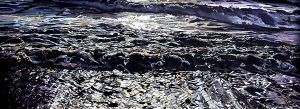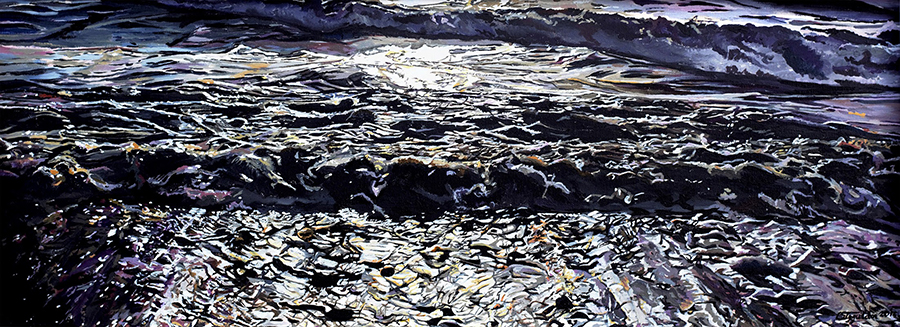‘The Earth is the Lord’s and all that is in it, the world and those who live in it; for God founded it on the seas and established it on the rivers.’ Psalm 24:1-2
Every 22nd of April, environmental revolutionists and conservationists worldwide gather in solidarity to help protect and restore the health of our natural environment.
Since it was officially recognised in 1970, one billion Earth Day supporters have petitioned world leaders, national governments and local legislations to combat the (often) human made issues that have afflicted our planet.
The event this year addresses a topic that is difficult to ignore: Plastic pollution. According to Earth Day Network, over 300 million tons of fossil fuel created plastic is sold each year and 90% is emptied in landfills or ends up as litter. Chemicals seep into the ocean and soil, severely damaging our environment, wildlife and our own health by contaminating the fish we eat or water we drink.
I chose to use my oil painting, ‘Night Waves,’ to illustrate Earth Day, as over 70% of the earth is made up of water, with 96% consisting of the ocean’s salt water and the rest of arctic ice, groundwater and fresh water. The oceans are similar to rainforests in their biodiversity, they also produce more than half of the world’s oxygen and absorb more than half of its carbon. It is a precious yet fragile natural resource.

Historically, there has not been much regard for the ocean as a place to protect, and waste disposal has been rife. Disturbing facts seem to get more and more prevalent in recent years in relation to this last frontier of exploration; it is estimated that 4.6 billion tons of plastic are poured into the ocean worldwide per annum, suffocating marine animals which cannot digest it and polluting the environment. According to the National Geographic, one garbage truckload of plastic is dumped into the ocean every minute.
Plastic is no longer the miracle storage packaging, as its very longevity makes it virtually indestructible and non biodegradable. It is estimated that it takes around 10,000 years for ordinary plastic bags to decompose. Did you know that 4.5 billion coffee cups so far have been found in the ocean and around 8.5 billion plastic straws are thrown away each year, finding their way into the sea? It is estimated that over 100,000 sea mammals die each year from eating plastic.
Who didn’t feel upset at the sight of this sperm whale in Spain, who had been found washed up on shore having suffocated after eating 5 tons of plastic, fishing nets and garbage bags? Or the now famous image of a seahorse clutching onto a cotton bud in Indonesian waters?
The filmmakers of Blue Planet II said there was rarely a moment when they dived and didn’t encounter plastic in the sea. Alarmingly, we may also have been ingesting it in the form of microplastics, tiny beads of plastic that are found in many cosmetic products and when washed away down the sink find themselves in the ocean and into the bodies of sea creatures which we may be ultimately eating. In a recent study, over 83% of tap water samples worldwide was found to be polluted with microplastics.
The race to produce renewable alternatives has begun. DowDuPont scientists are revolutionising plastic bottles by creating a molecular chain that derives from cane sugar rather than petrochemicals. This sweet alternative is sustainable and will never run out, as chemist Paul Fagan says, bio-plastics are like returning to our past, where everything was made from plants. Engineer Toby McCartney is also pioneering a way of using recycled plastic instead of oil as a bidding agent in asphalt, creating longer-lasting roads and decreasing plastic waste. Scientists have also further improved a naturally occurring enzyme which can digest plastic; originally found in Japan, this enzyme can break down PET, the strong plastic most commonly used in bottles, in just a few days as opposed to hundreds of years.
Until a permanent solution has been found or a new plastic becomes commonplace, there are many quick solutions that can be adopted, such as investing in recyclable materials, refusing plastic cutlery, reusing bags or coffee cups. and using paper straws. A ban on microplastics in cosmetics has already been passed in the UK and cotton buds and plastic straws could be banned next year.
We all depend on a healthy ocean but currently only 2% of our seas are fully protected. You can sign a government petition here to help end single-use plastics or make a personal pledge for Earth Day.
It’s time to save Nemo!
